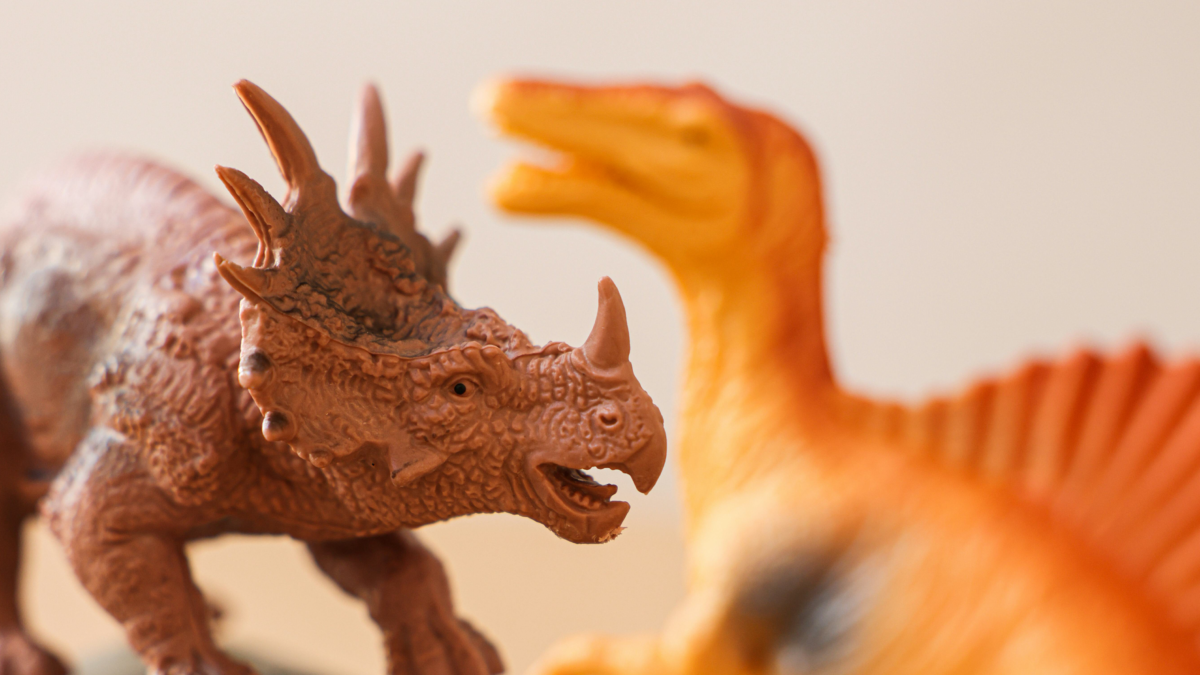I wrote this short story last year as my fiction piece for my Introduction to Creative Writing university course.
Her father told her not to bring the plastic dinosaurs on board. She smuggled them in anyway in her spacesuit. Now they’re standing in a tidy line on the metal desk of her cabin: green Tyrannosaurus rex, purple Pterodactylus antiquus, yellow Brontosaurus excelsus, brown Triceratops horridus. She picks up the Tyrannosaurus and holds it, turning it over and over with nervous compulsion.
When Emilia narrated her dinosaur-smuggling caper to Dr. Grace, the biologist laughed so hard that she nearly broke a pipette. Dr. Grace made her recount the whole story of their departure from Earth. Emilia was nine at the time, practically drowning in her spacesuit, so there was ample room for dinosaurs. Her father wasn’t at her side, either; he’d been off doing whatever an admiral must do to prepare for mankind’s first extraterrestrial colonial mission. There was a military parade and a brass band playing America the Beautiful, Emilia recalled, and the moment after she waved a tearful goodbye to her mother and younger siblings, she was suddenly surrounded by video cameras and reporters: “My daughter is obsessed with you. What advice do you have to the millions of Americans who look to you as a hero?”
She has never outgrown the dinosaurs. Seven years since blastoff and nothing feels more like home than the four of them. Probably not even Earth itself, if she ever did go back. There’s no chance of that now. She puts down Tyrannosaurus rex, adjusts his plastic base so he’s aligned with the others. She lies on her bed. She is about to die.
The announcement came earlier this week. Her father called all non-essential personnel to the wardroom and the vice admiral stood and delivered the news.
“Last night, the power array suffered a critical failure. Dr. Maines has been working on the issue nonstop, but it appears the damage may be irreparable. Due to the nature of the damage, we have at maximum four days before full power loss.”
The admiral sat as the message was read. Eyes like razors, daring anyone to speak, peeling words out of the crew’s teeth. They lingered for too long on Dr. Gwen Grace, who oddly enough seemed to be the only one in the room not in some phase of hysteria. There was shouting, there was arguing, and there was Gwen, draped in quiet dignity. The admiral’s eyes moved on, and landing on Emilia, kindness returned to them, a smile at the corners. Emilia looked away.
Emilia often visits the biology lab when her father is busy, which is almost always. Gwen is the only other dinosaur expert on board. Last week, Emilia pushed open the door—”How are the plants?”—to find the scientist pacing nervously between the rows of equipment.
“Did you hear? Your father changed the timetable for landing. He cut the testing and reconnaissance period from two months to three days. Three days! That gives us no time for even the most basic biotic tests. We could wipe out the entire planet from disease! And if we destroy their biological diversity, we go with it.”
“Wow,” Emilia said. “Why would he change it so close to arrival?”
“With the admiral? Hell if I know. Some imagined ‘military advantage,’ or something. I’m glad you turned out all right, somehow.” Gwen smiled. “God have mercy on us though, we’re like some metal rock of death hurtling toward their planet, and all the evidence says only one of us is going to survive impact. If that.” She shook her head sadly. “But what is there to do about it now?”
Five minutes later, Emilia was at the door of her father’s cabin. She knocked three times before the door opened to the admiral’s huge silhouette, a broad smile on his face.
“Em!”
She took a deep breath. “I was speaking with Gwen, and she was concerned about the landing protocol. She said that—”
“Oh, Em,” he said. “Don’t worry yourself about that. The landing protocol? That’s for the scientists to worry about. The two of us are here to lead civilization! You’re going to be a real princess.” He smiled. She forced herself to do the same. The cabin door shut.
There is a picture of a boy on the metal desk beside Emilia’s bed. She knows every pixel of the image, even though the real boy is here on the ship. Marcus Pridge, son of one of the officers. The boy Emilia is to marry. Her father sat her down at thirteen and explained in clear, logical terms the necessity and mechanics of the propagation of the human race. It is a primary colonial objective, a linchpin of future political stability, and a primary reason for Emilia’s invitation in the first place. Marcus is a nice kid, she thinks. though sometimes he forgets whether screws unscrew to the left or right. She feels nothing like romance. But there is nothing to be done about that.
And now…poor Marcus. Emilia’s heart has not beat two regular beats since the power array was destroyed. She fiddles with her earring clasp. Open, closed. Open, closed. Her hand is shaking. Open. She threads it through her ear. Closed. She must speak to someone.
Intruding on Gwen’s office, one wouldn’t suspect the woman is about to die. She is rushing to a microscope, draped in a lab coat. The biologist turns her head. By the bags under her eyes, maybe she’s been awake doing science since the news dropped.
“Your father is convinced it was sabotage,” Gwen says.
“Sabotage,” Emilia repeats. “Gwen, I…”
Gwen puts down her pipette, walks to Emilia, and wraps her in a hug. Emilia is taller. She begins to cry, a flood all at once, pitiful like a child. Gwen says, “I know. I know. Please don’t cry.”
“I’m so scared. I’m so scared.”
Their embrace seems to Emilia to last an hour. When at last they break, Gwen says, “I always doubted we were doing the right thing. Colonizing a planet? Ha! Look what we did to our old one. Good riddance, I think.” Emilia cries even harder; Gwen puts a hand on her shoulder. More seconds like infinity.
“But listen to me, Emilia,” Gwen finally says. “You’ve got to talk to the admiral. Make him call off the search for the saboteur. We ought to be able to spend our last days in peace, not under the thumb of this tyrannical witch hunt. He’s a fanatic, and the only person he’ll listen to is you. Can you do that?”
Emilia nods. Gwen squeezes her shoulder. “Atta girl. I love you.”
The admiral is not in his office. Emilia walks the halls for an hour before she catches a glimpse of him in his dress whites, striding with grim determination. Her heart nearly springs from her chest. But she has decided. She stalks toward him.
He sees her and quickly puts on a smile. “Em, I’m so sorry, but there’s so much on my mind right now.” The infinite anger is there, pressed up against the gates of his words, straining to break free. “It isn’t you. Everyone on board this ship is like a child to me. I’m their admiral. I’m your dad, but I’m everyone else’s, too.”
“Dad. It was me.”
“What was you?”
“Dad. The power array. I destroyed it.”
“What?” He laughs. “No you didn’t.”
“No. Dad. Look at me.” Emilia grabs his wrist. Meets his eyes. “I took a hammer to it and smashed it to bits, and if you want, I can show you that hammer right now.”
The admiral is seeing his daughter, and it’s as if she’s an alien. The circuitry of his brain is visible on the wrinkles of his forehead. He shuts his eyes. “Of course it was you,” he says softly.
She waits for the anger. She waits for him to demand why; words and arguments are bubbling in her head about disease and biodiversity and military dictatorship. But nothing comes. The admiral just shakes his head again. “Of course it was you.” He rubs his eyes, suddenly weary under all the stateliness of his uniform. Calm, brittle: “I never want to see you again.”
“Sir, yes, sir,” Emilia says. And leaves.
Now she is here. She counts the rivets on the ceiling above her bed and imagines the world that they would have invaded. She sees it now—yes! There are enormous dinosaurs on that world, three times as big as the ones on Earth, and some that can both fly and swim. And people can ride them!
The ship’s lights wink out. There is a whirring and creaking of machinery; the plastic dinosaurs shiver and rattle in place. Then little more.
Perhaps soon this ship will be nothing but space junk, a silent metal graveyard discarded among the stars. Perhaps, billions of years from now, some alien scientist will catch sight of the wreckage. Perhaps they will think it’s just another asteroid soaring by, clueless, indiscriminate. Or perhaps they will not, and they will find it and scour the debris and discover the ignorant bones of terrified men and plastic dinosaurs. ∎
This piece went through several revisions. An earlier draft, entitled The Admiral’s Daughter, had a quite different protagonist, and you might enjoy reading it as well. You can find it here.


